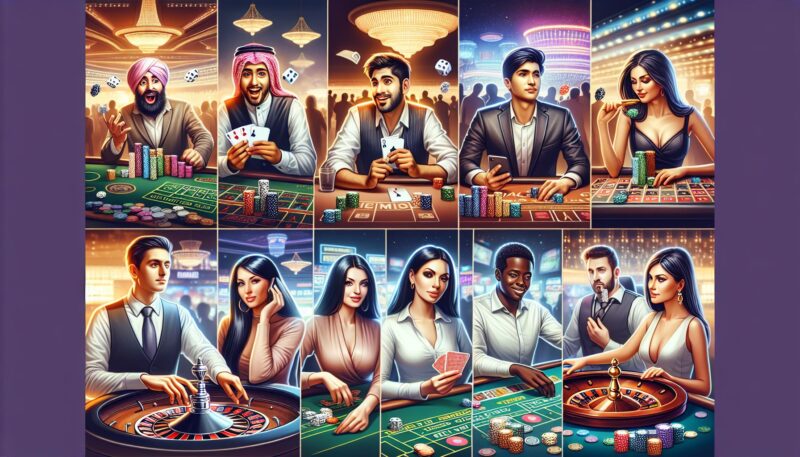Gambling has been a popular form of entertainment throughout human history, with evidence of primitive forms of gambling found in ancient civilizations. From the spin of a roulette wheel to the thrill of a hand of poker, the idea of taking a risk in hopes of a reward has captured the human mind for centuries.
But have you ever wondered what makes gambling so appealing to us? Why do we willingly spend our hard-earned money in casinos, despite knowing the odds are against us? The answer lies in the psychology of gambling, which is a complex and fascinating topic that sheds light on our behavior and motivations. In this blog post, we will delve into the psychology of gambling and explore what drives us to the casino floor.
The Thrill of Uncertainty
One of the main reasons people are drawn to gambling is the thrill of uncertainty. The feeling of not knowing whether you will win or lose is both exciting and arousing, triggering a release of dopamine in the brain. Dopamine is a neurotransmitter that plays a key role in reward-motivated behavior and is associated with feelings of pleasure and satisfaction. When we engage in gambling, the anticipation of a potential win triggers a dopamine rush, making us feel good and wanting more.
The allure of uncertainty is also enhanced by the concept of “near misses.” In gambling, near misses occur when a player comes close to winning but falls short. The psychological effect of a near miss is similar to that of a win, as it prolongs the anticipation and reinforces the belief that the next turn could be the big one. This explains why some people become even more determined to continue gambling after experiencing a near miss, chasing the feeling of winning.
The Gambler’s Fallacy
Another factor that contributes to our attraction to gambling is known as the gambler’s fallacy. This is the belief that if something has not happened for a while, it is due to happen soon. For example, if a coin has landed on heads ten times in a row, the gambler’s fallacy would assume that the next toss is more likely to be tails. In gambling, this can lead to the false belief that a particular game is “due” for a win, thus encouraging people to keep playing.
The gambler’s fallacy is a result of our mind’s tendency to look for patterns and make sense of random events. This cognitive bias can be reinforced by the casino’s design. For example, slot machines are programmed to deliver a certain number of wins and losses, creating the illusion of patterns and streaks. This ultimately entices people to keep playing, despite the odds being against them.
The Social Aspect
Gambling is often a social activity, whether it is with friends at a casino or playing poker online with strangers. For some people, the social aspect is the primary motivation for gambling, as it provides a sense of community and belonging. The social aspect of gambling is particularly appealing to those who may struggle with social interaction in other areas of their lives.
The social aspect of gambling can also lead to peer pressure, where individuals may feel the need to keep up with their friends’ or peers’ gambling habits. This can lead to excessive and often reckless gambling behavior, as individuals try to impress or fit in with their social circle.
Escapism
For some individuals, gambling provides an escape from reality. It can be a way to forget about problems and stresses in life, even if it is just for a moment. The thrill and excitement of gambling offer a temporary distraction from the daily grind, providing a form of relaxation and entertainment. This is particularly true for people who struggle with anxiety, depression, or other mental health issues.
However, the problem with using gambling as a form of escapism is that it can quickly spiral out of control. As the excitement wears off and losses start piling up, individuals may find themselves trapped in a vicious cycle of chasing losses, leading to financial, emotional, and psychological problems.
The Illusion of Control
Another essential element of gambling psychology is the belief that we have some control over the outcome of a game. When we play a game of skill, such as poker or blackjack, our skills and decisions can influence the outcome to some extent. This illusion of control can be an appealing aspect for gamblers, making them feel like they have an advantage over the house.
But even in games of chance, such as slots or roulette, individuals may convince themselves that they have some control over the outcome. This can lead to the false belief that they can beat the odds with the right strategy or by using a particular lucky charm or ritual. This illusion of control can keep individuals hooked on gambling, as they believe they have some control over their luck.
Conclusion
The psychology of gambling is a complex and multifaceted topic, with various factors contributing to our attraction to this form of entertainment. From the thrill of uncertainty and the gambler’s fallacy to the social aspect and the illusion of control, the casino floor is designed to captivate our minds and keep us coming back for more.
However, it is essential to remember that while gambling can be a fun and entertaining activity, it can also lead to destructive behaviors and consequences. It is crucial to gamble responsibly and seek help if gambling starts to take a toll on your life. As the saying goes, “the house always wins,” and it is essential to know when to walk away and enjoy the thrill of gambling in moderation.










